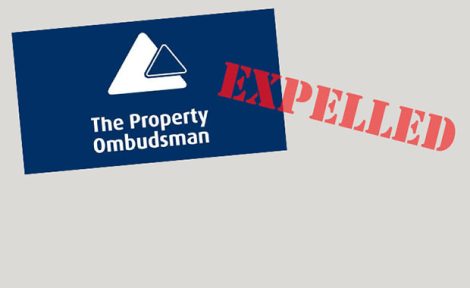The Ombudsman Files – A high price for an early exit
The Property Ombudsman, Rebecca Marsh, reviews a case where an agent gave the early termination fee to the landlord instead of the tenant.

The Property Ombudsman (TPO) was asked to review a case from tenants in relation to the request for a refund of their early termination fee charged by the agent.
The tenants said that the agent had agreed that, depending upon when they moved out of the property, the sum paid would be refundable. The tenants said that the agent then informed them after they had moved out that they had made a mistake and that the cancellation fee was not refundable as it had been paid to the landlord for the re-letting fees he had incurred.
The tenants said the agent did not confirm the early termination date of the tenancy with them, and they found new tenants without informing the existing tenants (the complainants) in advance. The tenants sought a return of the cancellation charge (£1,993.68) and an unspecified sum of compensation to reflect the aggravation that the matter caused.
INVESTIGATION

Both the PO Code of Practice (2019), as well as the principles set out in the Tenant Fees Act 2019 (TFA) provide that the agent could charge an early termination fee if a tenant requested to leave before the end of their tenancy. However, the fee claimed could not exceed the financial loss suffered by the landlord in permitting the termination, and the costs reasonably incurred by the agent in this regard. Moreover, an agent should be able to demonstrate (through evidence) that specific costs were incurred. The Ombudsman would also expect an agent to act in accordance with the tenancy agreement and to communicate clearly, accurately and effectively regarding any early termination charges.
The parties agreed that the tenants entered into a fixed-term tenancy for a period of 30 months. The tenancy agreement did not contain a break clause which would have allowed the tenants to bring the tenancy to an end sooner. Therefore, the only way the tenancy could end early was by mutual agreement with the landlord.
When reading the tenancy agreement, it was the Ombudsman’s view that the clause relating to the tenant’s liabilities placed an obligation on the tenant to refund the landlord the cost of any agency commission for the remaining part of the tenancy agreement. However, she was critical of the use of some words which appeared confusing and unclear in the context in which the clause had been used. The use of the word ‘refund’ also gave the impression that the tenants were liable to refund any agency commission that the landlord had already paid for the duration of the tenancy.
TERMINATION FEE LIMITES
Where a landlord agrees to early termination, any early termination charge for agency commission can amount to the equivalent sum paid for the new tenancy where the terms of those tenancies overlap. For example, as the tenancy was for 30 months and the tenants left after 21 months with a new tenant moving in immediately upon their departure, there was a nine-month period in which the landlord would have in effect paid agency commission twice. As such, the landlord could seek to recover the pro-rata agency commission incurred for the second tenancy as an early termination fee. The Ombudsman would have expected the agent to be aware of this position and felt that the agreement did not reflect this position.
The parties agreed that the tenants sought an early release from the tenancy agreement and alluded to extensive correspondence on this point. However, the agent did not provide evidence of this, other than a summary email which, again, the Ombudsman felt left the impression that the sum calculated was based upon a sum that the landlord had already paid, rather than one he would pay for a new tenancy.
The Ombudsman was critical that the explanation of the fee in the email gave rise to the tenant’s reasonable expectation that, should a new tenant be found immediately, a refund of the early termination fee would become due to them. Such an explanation was neither in keeping with the Code requirements, the tenancy agreement or the TFA. Even after further discussions with the tenants, at no point did the agent give any indication that the fee was not refundable.
The tenants confirmed their ability to vacate the property on a particular date, and the new tenants took possession of the property two days later.
AGENT ADMISSION?
This was confirmed to the (complainant) tenants 19 days later at which point they engaged in correspondence with the agent to obtain refunds of various sums of money, including an overpayment of rent, the deposit and the early termination fee. At this point the agent apologised for their error in detailing the early termination fee as refundable when it was not. This was the first reference of the tenants being informed that the fee that they had already paid, on the premise that it was refundable, was in fact, non-refundable.
The Ombudsman was further critical of the agent’s response to the tenants’ formal complaint, where they explained (incorrectly) that the landlord was charging the tenants agency commission for their tenancy and not for the period of the new tenancy.
The Ombudsman found that the tenancy agreement, the agent’s understanding of the matter and their communication with the tenants did not reflect the correct position on the matter and, moreover, the agent expressly indicated to the tenants that the early termination fee was in fact refundable were a tenant to move in straight after their tenancy ended.
OUTCOME
Critically, the agent took no steps to identify the shortcomings in their service until after the tenants had accepted the early termination fee on the premise that this sum would be refundable, and even when they did so, their explanation of the calculation of the sum paid was not reflective of the position that they had consistently explained to the tenants.
Whilst the Ombudsman took note of the agent’s comments and evidence to demonstrate that the fee was paid over to the landlord (and it was), the fact remained that the tenants’ confusion and aggravation stemmed entirely from the agent’s shortcomings. Therefore, the Ombudsman made a compensatory award of £1,993.68 to the tenants, this being akin to the sum that they paid to the agent.
The Ombudsman did not find that the circumstances merited a further compensatory award. This was because the tenants were released from the tenancy early, as per their request, and the award, akin to the fee that they reasonably believed was refundable, put them back in the position they believed they would have been in, but for the shortcomings in the agent’s service.





